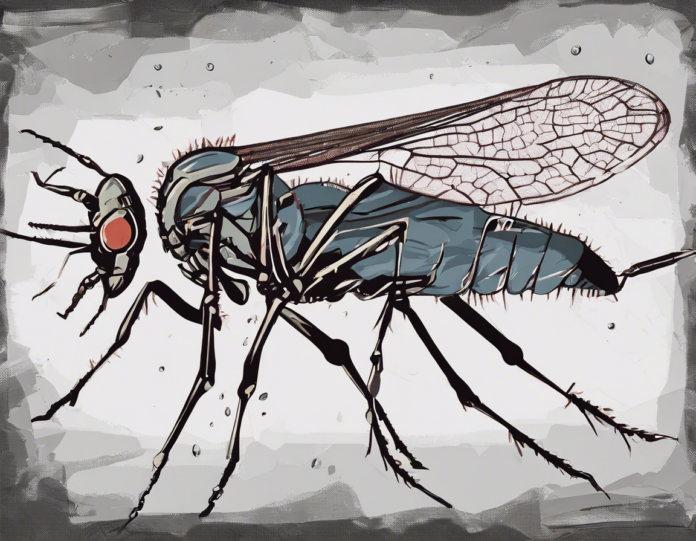Dengue fever is a mosquito-borne viral infection that poses a significant public health threat in many parts of the world, with an estimated 390 million infections occurring annually. The disease is prevalent in tropical and subtropical regions, primarily in urban and semi-urban areas. Dengue is caused by one of four closely related but antigenically distinct virus serotype strains (DEN-1, DEN-2, DEN-3, and DEN-4) that are transmitted to humans through the bites of infected Aedes mosquitoes, primarily Aedes aegypti and, to a lesser extent, Aedes albopictus.
Early detection of dengue fever is essential for timely medical intervention and to prevent severe complications such as dengue hemorrhagic fever (DHF) and dengue shock syndrome (DSS). Understanding the symptoms associated with dengue fever is crucial for prompt diagnosis and management.
Common Symptoms of Dengue Fever:
Dengue fever typically presents with a sudden onset of symptoms after an incubation period of 4-10 days following the mosquito bite. The clinical manifestations can vary from mild to severe and may include:
- High Fever: Abrupt onset of high fever, often exceeding 104°F (40°C).
- Severe Headache: Intense headaches, especially behind the eyes.
- Pain Behind the Eyes: Eye pain, which may worsen with eye movement.
- Muscle and Joint Pain: Severe muscle and joint pain, often described as “breakbone fever.”
- Skin Rash: Characteristic petechial rash or generalized skin rash.
- Nausea and Vomiting: Persistent nausea and vomiting.
- Fatigue: Generalized weakness and fatigue.
- Mild Bleeding: Minor bleeding manifestations like nosebleeds, gum bleeding, or easy bruising.
Warning Signs of Severe Dengue:
While most cases of dengue fever are mild and self-limiting, a small proportion of patients may progress to severe dengue. It is essential to be vigilant for warning signs that may indicate a higher risk of developing complications. These warning signs can include:
- Severe Abdominal Pain: Persistent abdominal pain or tenderness.
- Persistent Vomiting: Continuous vomiting or inability to tolerate oral fluids.
- Mucosal Bleeding: Bleeding from the gums, nose, or in the stools.
- Restlessness or Irritability: Agitation, restlessness, or altered mental status.
- Fluid Accumulation: Signs of fluid accumulation such as pleural effusion or ascites.
- Liver Enlargement: Liver enlargement detected on physical examination.
- Sudden Drop in Platelet Count: Abrupt decline in platelet count (<100,000 cells/mm3).
- Hematocrit Increase: Rising hematocrit levels with decreasing platelet count.
Diagnosing Dengue Fever:
The diagnosis of dengue fever is primarily based on clinical features, travel history to endemic areas, and laboratory tests. Diagnostic tests commonly used for confirming dengue infection include:
- Reverse Transcription-Polymerase Chain Reaction (RT-PCR): Detects viral RNA in the early phase of the illness.
- Enzyme-Linked Immunosorbent Assay (ELISA): Detects dengue virus-specific IgM and IgG antibodies.
- NS1 Antigen Test: Rapid test for detecting the NS1 antigen during the acute phase of infection.
- Complete Blood Count (CBC): Evaluates platelet count, hematocrit, and white blood cell count.
- Liver Function Tests (LFTs): Assess hepatic involvement and monitor liver function.
Timely diagnosis and appropriate management are crucial to prevent complications and reduce the risk of mortality associated with severe dengue. Patients with suspected dengue fever should seek medical attention promptly, especially if they develop warning signs or symptoms of severe dengue.
Management of Dengue Fever:
There is no specific antiviral treatment for dengue fever, and management is primarily supportive. The goals of treatment are to relieve symptoms, maintain hydration, and prevent complications. Key aspects of managing dengue fever include:
- Fluid Replacement: Encourage oral rehydration solutions or intravenous fluids to prevent dehydration.
- Fever Control: Use antipyretic medications like acetaminophen (paracetamol) to control fever.
- Pain Relief: Administer analgesics such as acetaminophen or ibuprofen for muscle and joint pain.
- Close Monitoring: Monitor for signs of fluid leakage, bleeding, and rapid clinical deterioration.
- Hospitalization: Consider hospital admission for patients with severe dengue requiring intensive care.
Prevention of Dengue Fever:
Prevention strategies play a crucial role in reducing the burden of dengue fever and preventing outbreaks. Effective prevention measures include:
- Mosquito Control: Eliminate breeding sites by draining standing water and using insecticides.
- Personal Protection: Use mosquito repellents, wear long sleeves and pants, and install screens on windows.
- Community Engagement: Promote awareness and community participation in vector control activities.
- Vaccination: Consider vaccination in endemic regions with the approved dengue vaccine (where available).
- Travel Precautions: Take precautions while traveling to dengue-endemic areas to prevent mosquito bites.
FAQs (Frequently Asked Questions):
- What are the main symptoms of dengue fever?
The main symptoms of dengue fever include high fever, severe headache, muscle and joint pain, skin rash, nausea, and vomiting, among others.
- How is dengue fever diagnosed?
Dengue fever is diagnosed based on clinical features, travel history, and laboratory tests such as RT-PCR, ELISA, NS1 antigen test, CBC, and LFTs.
- What are the warning signs of severe dengue?
Warning signs of severe dengue include severe abdominal pain, persistent vomiting, mucosal bleeding, restlessness, fluid accumulation, liver enlargement, low platelet count, and rising hematocrit levels.
- Is there a cure for dengue fever?
There is no specific antiviral treatment for dengue fever. Management is supportive, focusing on symptom relief, hydration, and close monitoring for complications.
- How can dengue fever be prevented?
Preventive measures for dengue fever include mosquito control, personal protection, community engagement in vector control, vaccination (where available), and taking travel precautions in endemic areas.
- Can dengue fever be fatal?
Severe dengue can be life-threatening, particularly if not promptly diagnosed and managed. Early detection of warning signs and timely medical intervention are crucial in preventing complications and reducing mortality.
- Is dengue fever contagious?
Dengue fever is not directly contagious and does not spread from person to person. It is transmitted through the bite of infected Aedes mosquitoes.
- How long does it take to recover from dengue fever?
The recovery period from dengue fever varies from person to person. In mild cases, recovery may occur within a week, while severe cases requiring hospitalization may take longer.
- Can you get dengue fever more than once?
Recovery from dengue fever typically confers lifelong immunity against the infecting serotype but not against the other serotypes. Subsequent infections with different serotypes increase the risk of severe dengue.
- Are there any specific dietary recommendations for dengue patients?
Maintaining adequate hydration is crucial for dengue patients. Consuming a balanced diet rich in fluids, electrolytes, and nutritious foods can help support recovery and boost the immune system.
In conclusion, understanding the symptoms, warning signs, diagnosis, management, and prevention strategies for dengue fever is essential to mitigate the impact of this potentially severe disease. By being informed and proactive, individuals and communities can contribute to reducing the burden of dengue and promoting public health safety.





